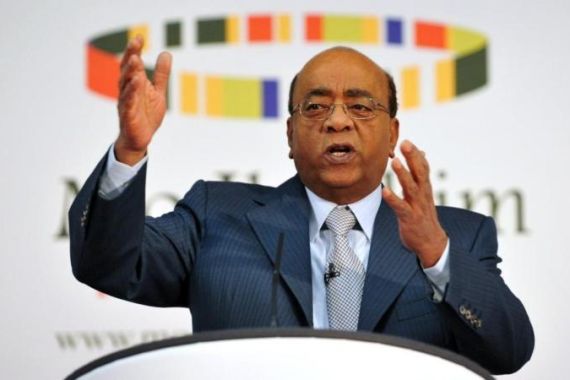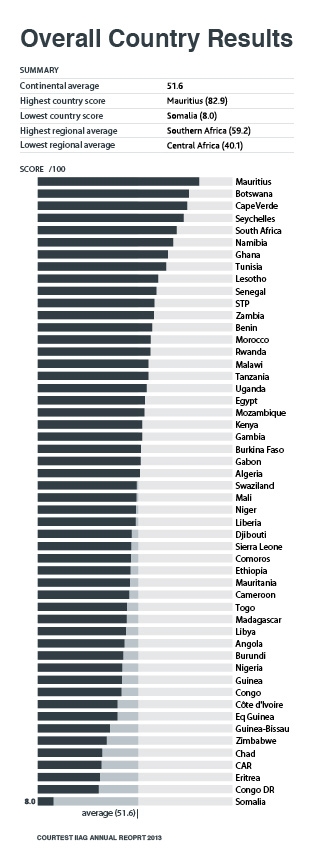Q&A: Africa leaders not good enough for award
Billionaire Mo Ibrahim discusses why no African leader qualifies for the $5m governance prize he sponsors.

The Mo Ibrahim Prize for Achievement in African Leadership is the world’s most generous prizes. It is also proving to be one of its most elusive, after the prize committee announced on Monday that there was no African leader who met the criteria for the 2013 award.
This is the second year in a row that no suitable candidate has been found. Since its inception in 2007, the prize has only been awarded three times.
Dr Mo Ibrahim, a Sudanese-British telecoms tycoon and philanthropist, established the London-based Mo Ibrahim Foundation to help inspire good governance and exceptional leaders. By finding so few candidates that meet its standards, critics of the award argue it reinforces negative stereotypes about African leaders.
Al Jazeera’s Yasmine Ryan spoke with Dr Ibrahim about why the foundation is finding it so hard to find awardees, the relationship between rising inequality and worsening rule of law, and the controversy surrounding the International Criminal Court’s (ICC) focus on African leaders.
Al Jazeera: Were there any leaders who might have qualified who were under consideration for the Mo Ibrahim Prize this year?
Mo Ibrahim: Yes of course, I’m not a member of the prize committee, but according to the rules, the committee looks at the people that left office in the last three years, peacefully. It is up to the prize committee to decide whether people meet the standard. We set a very high standard, of course. And we are proud of our prize committee for being credible and tough. It’s a prize for excellence, it’s not a pension.
| The Mo Ibrahim Prize |
|
A $5-million award followed by $200,000 a year for life Winners include Botswana’s Festus Mogae, Mozambique’s Joaquim Chissano.and Cape Verde’s Pedro Verona Pires Eligible leaders must have been democratically elected and have left office peacefully within the last three years In 2009, 2010, 2012 and 2013 no award was given |
AJ: Do you think it’s time to expand the prize, perhaps to include the many non-heads of state who are playing a positive transformative role?
MI: We created a brand, a prize, for a specific reason. We should not tinker with that. If there is a need to offer prizes to wonderful parliamentarians, to great newsmen or women, to footballers, or whoever, that’s fine. But we should not just mix up things together and destroy the brand we have just because one or two years we don’t have a winner.
What is the objective of this? It’s focusing on presidents as tools to change their countries, given the power they have. We have not cornered the market on prizes and we invite everybody else to offer prizes for civil society, for the best NGO, for whatever.
Ourselves, we offered a different kind of prize for the Archbishop Desmond Tutu. This was a prize for a brave man who spoke truth to power.
AJ: The Nobel Peace Prize committee is, interestingly, often criticised for the opposite reason; for not being selective enough. Do you think the Nobel Peace Prize committee could learn something from the Mo Ibrahim Foundation?
MI: I will not start by criticising the Nobel Peace Prize committee, because on my committee we have three Nobel Prize winners, and I’m afraid to upset them! [Laughs] So I pass, no comment.
AJ: The Ibrahim Index of African Governance ranking countries according to their performance was also released today. You have said that the information collated in the index is an important empowering tool for citizens in the countries surveyed. In what ways can citizens use this information?
 |
| From the 2013 Ibrahim Index of African Governance |
MI: This is a scorecard. It shows exactly what has been achieved over the last 13 years. We’ve been publishing very detailed data over 13 years. We have 133 parameters we measure. It gives people full details: How effective is the police force? How effective is the judiciary? Women’s social and economic rights…
This is a wealth of information, for people to see what is strong, to keep doing it, and what needs to be fixed. It also gives an opportunity to compare your performance with that of your neighbour, to enable conversations, peer review. We can pick up the phone and say “What are you doing here”?
Every time I meet an African president, they open up the index. They love it, because it can help them improve their performance.
AJ: The index shows that the gap between the best and worst countries is widening. Do you think this growing inequality is a uniquely African issue, or you think it is part of a global trend?
MI: There are two areas of inequality. One issue is that we see that eight countries have been in the top ten since the beginning of our data collection. It seems the guys who got it right, they build their institutions and it keeps them on the right path.
At the bottom, actually there have been a lot of changes. The best improvement, actually, has been from some of the countries at the bottom, that managed to get out of poverty and did not fall back into the vicious cycle of poverty.
The second part [of the issue of inequality] is that the fruits of the economic progress, somehow appear to be limited to the top one percent of the population. That is producing a widening gap between the wealthy and the poor. That produces tension. This phenomenon is not just an African phenomenon, it’s happening in the US, it’s happening in the UK, it’s happening everywhere.
This is dangerous. You are building tension inside society. You will reach a point where social cohesion is destroyed.
AJ: The index also showed a trend of worsening levels of personal safety and the rule of law. What are the factors driving these trends?
MI: I just told you.
AJ: That it’s due to the inequality?
MI: Exactly. Most of the violence before was happening because of tensions and hostilities across borders. Now it is happening because of conflict within the country. We need to look [at] why are we are lacking social cohesion.
 |
| From the 2013 Ibrahim Index of African Governance |
AJ: You’ve spoken in the past about how Africa’s youthful population gives it the possibility of becoming the next “factory of the world”. Which countries do you think are best place to do this?
MI: I wouldn’t like to pick one country. I think the country that’s going to do this is the country that’s going to produce a better education for its young people, better training for young people. We need people who are able to serve the new economy. We need people who are versed in the new software, people who are good with their hands, smart kids.
AJ: Kenya’s President Uhuru Kenyatta has called the International Criminal Court “imperialist and racist”, and there are many African leaders who agree with him. Do you think there is any truth to their assertion that the ICC has targeted African leaders unfairly? If so, what’s the alternative?
MI: I think there’s a need for a serious conversation between the African Union and the ICC. On one hand, the allegation that the ICC has only tried or prosecuted African leaders is correct. Do atrocities only happen in Africa? What is happening in Myanmar, what is happening in Baghdad? Where is the ICC? That’s a valid question.
On the other hand, Africa has no alternative to the ICC. We don’t have an African criminal court that is capable of really trying crimes against humanity. So when we have victims in Africa – and we do have victims in many cases – who can give them justice?
Instead of throwing out the baby with the bathwater, we need to find a way to reconcile the two. We need to find a way to the ICC so that it doesn’t become just a political tool, as it is perceived by some African leaders.
Global governance is in crisis. Do we say “let us withdraw from the United Nations”? We love the United Nations, we need the United Nations, what we need to do it to try and reform it, because we need it.
That is the same approach we need to take with the ICC and some of these other global governing bodies. Let’s be cool-headed, and find a way to move forward.
You can follow Yasmine Ryan on Twitter: @YasmineRyan